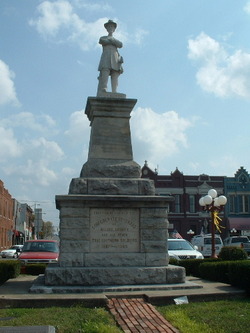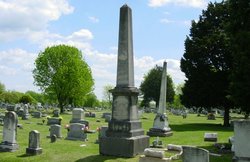
Robert Hopkins Hatton
One of the northern born Confederate general's was Robert Hopkins Hatton who was born in Ohio in 1826. The son of a preacher, he moved with his family to Tennessee at the age of eight. At the age of fourteen, he had a severe fever. Physicians prescribed him oral mercury which burned his lips to the point that when he made speeches later in life, his mouth would froth. By 1850, he was practicing law in Lebanon, Tennessee. He was elected to the state legislature in 1855 and ran against Isham Harris for governor in 1857. The two men campaigned hard against each other, at one point they got into a fist fight. Hatton lost the campaign to Harris who would become Tennessee's wartime governor.
When the southern states began to secede, Hatton worked tirelessly to keep Tennessee in the Union. His figure was burned in effigy by his hometown because of his pro-Unionist views. All of that was before Abraham Lincoln called for volunteers to invade the South. Hatton lost faith in the Union and joined the Confederate Army. He was elected colonel of the 7th Tennessee Infantry and his regiment was ordered to the mountains of western Virginia. During the cold winter of 1861-1862, he came down with camp fever. His health would suffer in the cold mountains of western Virginia. He attempted without success to have his regiment transferred back to Tennessee.
By late May of 1862, he was back in good health and had also received a promotion to brigadier general. His brigade was sent to join Joseph E. Johnston's army guarding Richmond. His brigade arrived on the battlefield of Seven Pines on May 31, 1862.
Another pre-war photograph of Robert Hopkins Hatton
Mounted on his horse named "Old Ball," he led his brigade forward across an open field and into a swamp of thick brush. He rode forward, waving his hat, and shouting, "Forward, my brave boys! Forward!" President Davis was on the field personally watching the charge and remarked, "That brigade moves in handsomely, but it will lose its commander." At that moment, the Federal line unleashed a volley into the charging Tennesseans and General Hatton was instantly killed. Some sources say his horse was killed first and General Hatton was killed as he charged ahead on foot. The attack was repulsed, but not before his men brought the body of their beloved commander off the field.
Robert Hatton was 36 years old. First buried in Richmond, Virginia, his body was then buried in Knoxville, Tennessee. In 1866, his body would be brought home to Lebanon, Tennessee where he rests today in Cedar Grove Cemetery. His pistol had been found by a Federal officer in the mud the day after his death and thirty years later was returned to his family. The Louisville Journal called Hatton one of the purest, noblest, and best men.
An obviously retouched photograph of Hatton in a uniform

Monument to Robert Hatton in Lebanon, Tennessee

Grave of Robert Hatton


Hi Tim - Nice article about General Hatton.
ReplyDeleteDo you have any information about where in Richmond he was first buried and where in Knoxville he was subsequently buried?
I'm particularly interested in who originally buried him in Richmond and who moved him to Knoxville and then on to Lebanon.
Many thanks!
I'm sorry Robert, I do not, but I will make it one of my priorities to find an answer to your question and sorry for so long a reply. I have several questions about the burial histories of several Confederate Generals including how Johnston Kelly Duncan came to finally rest in the Confederate Cemetery in Franklin, Tennessee. If you know, please contact me at alacsaed@yahoo.com. Your friend, Tim.
Delete